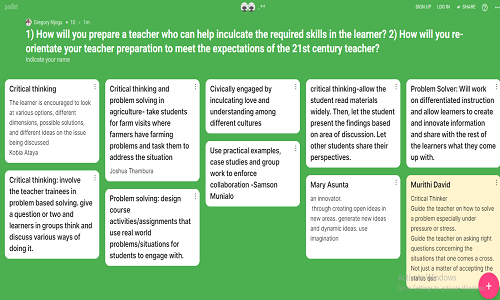Meru University of Science& Technology (MUST) Collaborates with CEMASTEA on Competency Based Curriculum
By: Ben Mwangi
The introduction of the Competency-Based Curriculum (CBC) signalled the end of an era in Kenya's Education where ranking and cut-throat competition were at the heart of the sector.
It heralded the dawn of a system of equal learning opportunities for all, which would usher opportunities for learners to identify and exploit their talents and God-given abilities. One of the expectations for the successful implementation of the CBC lies in creating awareness and training key sector players with a vested interest in this matter.

The training methodology involved the use of plenary presentations and discussions, group work and take-away assignments via resources such as the Padlet tool shown
In this spirit, CEMASTEA implemented customized training for lecturers from Meru University of Science & Technology’s (MUST) School of Education in topics aligned to CBC. The training was conducted virtually from 9th-12th May 2022.
The four days of training under the theme “Strengthen the capacity of teacher educators to equip teachers with the requisite skills and competencies relevant under the Competency-Based Curriculum” registered participation of 30 educators. The course covered four topics: Basic Education Curriculum Framework (BECF) and Competency-Based Assessment Framework (CBAF); Interpretation of Curriculum designs; ICT Integration in CBC, and Teacher Professional Development and Records.
The opening ceremony's Chief Guest was Professor Fatuma Chege, represented by Ms Ruth Mugambi. She informed participants that the State Department for the Implementation of Curriculum Reforms was mandated jointly with higher learning institutions and other stakeholders to prepare a rollout rationalization and migrate university education towards CBC aspirations. She noted that CBC is designed to offer a broad-based curriculum at the junior-school level that forms a foundation selection of pathways at Senior secondary and career-focused –schooling at the tertiary level. She was hopeful that the training would be a turning point for MUST to join other universities and stakeholders in the education sector in ensuring harmonious education reforms and migration to CBC. She told the university leadership that the Ministry of education was ready to provide any assistance as requested.
The closing ceremony was presided by the MUST Vice-Chancellor, who was represented by Dr Ibuathu Njati, Dean, School of Education. He acknowledged that while CBC is relatively new in Kenya, it has been fully operational in the United States of America since the 1960s. He indicated that CBC is the Philosophical umbrella that informs the core basics of teaching and notes that Africa has embraced this by focusing on student-learning outcomes. He reiterated that the job market has not been welcoming to university graduates; therefore, universities need to equip their graduates with 21st-century skills to counter this. He thanked training organizers for the effort, and exemplary work put in and wished for more engagements in the future.
The training was graced by the Principal Secretary of State Department For The Implementation Of Curriculum Reforms, Professor Fatuma Chege, represented by Ms Ruth Mugambi; University Council Chairperson, Professor Bosire Mwebi; Vice-Chancellor, Professor Romanus Odhiambo, represented by Acting Deputy Vice-Chancellor; Academic & Student Affairs, Professor Simon Thuranira; Director, Quality Assurance and Standards, Teachers Service Commission (TSC), Dr Reuben Nthamburi and Director, CEMASTEA, Mrs Jacinta L. Akatsa.
Latest from Esther Nyambura
- CEMASTEA Hosts Successful INSET Centre Principals’ Workshop
- CEMASTEA Conducts Successful Holistic Learning Training for Rwandan Teachers
- Empowering Quality Standards and Assurance Officers (QASOs) for Enhanced STEM Education
- Science and Mathematics Teachers Pilot Symposium: Innovative Classroom Practices
- CEMASTEA Strategic Plan 2023 – 2027: Key Highlights

